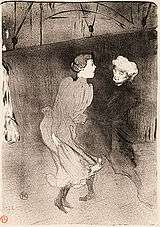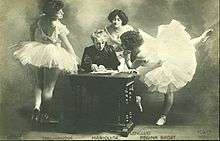Mariquita (dancer)

Mariquita, often referred to as Madame Mariquita, (1830–1922) was an Algerian-born dancer who became a successful choreographer and ballet mistress at various theatres in Paris from the 1840s until 1920.
Biography
Mariquita is said to have been found by a female dancer as a small child beside a fountain near Aumale in Algeria. She learnt to dance even before she could read.[1] She arrived in Paris in the 1840s and later became a choreographer and ballet mistress at the Théâtre de la Gaîté, the Folies Bergère and the Opéra Comique. She trained several show dancers of the period including Liane de Pougy, Émilienne d’Alençon and La Belle Otero.[2] One of Paris's most popular dance instructors in the late 19th century, she debuted at the Théâtre des Funambules in 1845.[3]
Mariquita was engaged by Albert Carré as ballet mistress at the Opéra Comique in 1898 where she remained until 1920, creating some 60 shows, while continuing her role as director of dance at the Folies Bergère. Carré reported that she "knew the dances of every period and from every country". According to Cléo de Mérode, despite her small size, she was an imposing figure, always standing straight so as not to diminish her height. Wherever she went, she had her lorgnette and her fan with her. She always held her fan in her right hand, using it as a conductor's baton.[1]
In 1900, she was appointed choreographic director at the Palais de la Dance at the Exposition Universelle. She retired on 16 April 1920 after an evening attended by the leading artists of the period, completing a career lasting over 70 years. Her repertoire was generally exotic and imaginative but towards the end of her career she introduced more complex routines including Basque and Greek dances.[4]
Choreography

There are records of Mariquita having choreographed the following shows:[5]
- 1884: Le Grand Mogol, Théâtre de la Gaîté
- 1893: L'Escarmouche, Théâtre des Folies-Bergères
- 1896: Les Cloches de Corneville, Théâtre de la Gaîté
- 1898: L'Enlèvement des Sabines, Théâtre des Folies-Bergères
- 1899: Cendrillon, Théâtre de l'Opéra Comique
- 1904: Alceste, Théâtre de l'Opéra Comique
- 1906: Aphrodite, Théâtre de l'Opéra Comique
- 1910: Les Lucioles, Théâtre de l'Opéra Comique
See also
References
- 1 2 "Du 19ème au 21ème siècle..." (in French). Folies Bergère. Retrieved 22 April 2014.
- ↑ "La Belle Otero, emblème de la Belle Époque" (in French). Histoire par l'image. Retrieved 21 April 2014.
- ↑ "Henri de Toulouse-Lautrec: Dress rehearsal at the Folies Bergère - Emilienne d’Alençon and Mariquita". National Gallery of Australia. Retrieved 21 April 2014.
- ↑ Guennec, François Le; Zmelty, Nicolas-Henri (2013). La Belle Epoque des femmes ?: 1889-1914. Editions L'Harmattan. pp. 79–. ISBN 978-2-296-53872-6.
- ↑ "Mariquita (1840?-1922) - Chorégraphe" (in French). Bibliothèque Nationale de France. Retrieved 21 April 2014.